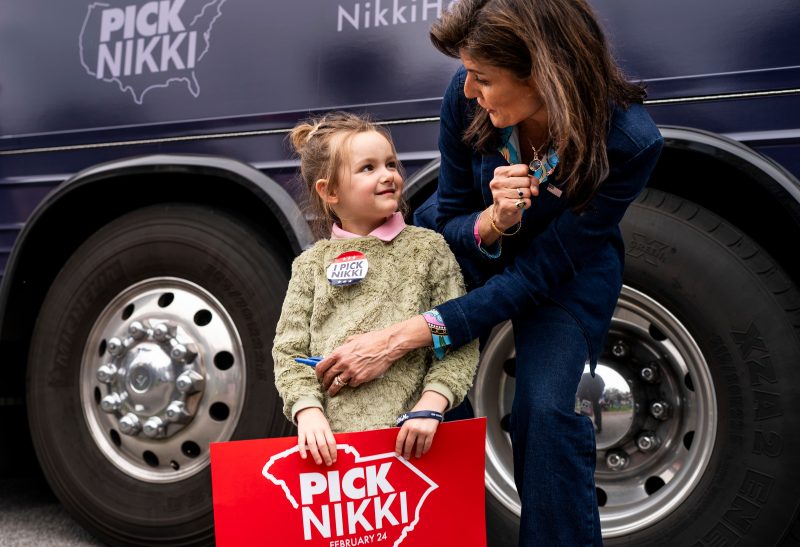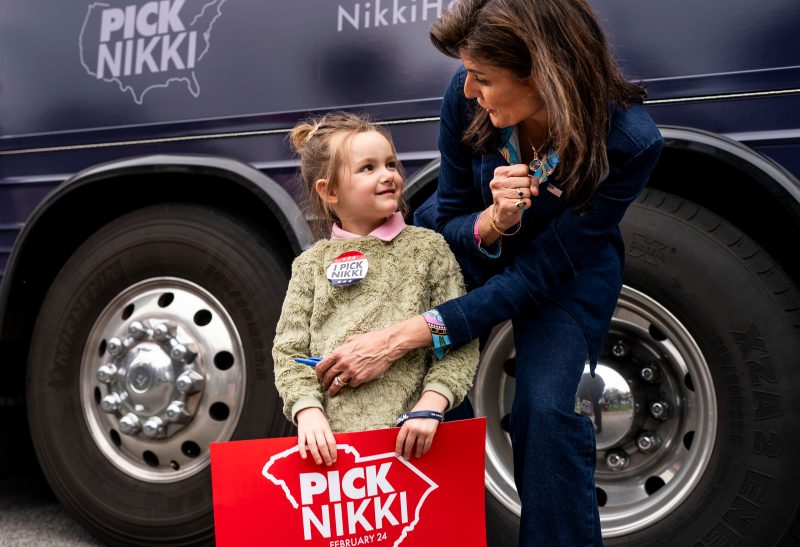
ROCK HILL, S.C. — Nine-year-old Joely Scherwitz bounced with excitement, hand outstretched and clutching a yellow beaded friendship bracelet reading “FEARLESS,” as she waited for Nikki Haley after a rally at a wedding venue here Sunday.
Bracelets like Scherwitz’s, adorned with the name of Taylor Swift’s sophomore album, have had a resurgence in the past year and have even made their way to the presidential campaign trail, where Scherwitz attracted the attention of Haley, who knelt to accept the bracelet.
“I love that it says fearless,” Haley said. “Because that’s what we have to be, right?” Haley promised to wear the bracelet, then posed for a photo with Scherwitz, her 11-year-old sister and 10-year-old friend, who all squealed.
Haley, a disciplined candidate who rarely departs from her stump speech, is often at her most animated while talking to the young girls who make up an unusually large segment of the crowds at her rallies. At dozens of campaign stops across multiple states, Haley beelined to talk to the girls, frequently offering them an extra touch of attention, such as adding a bonus message or hand-drawn heart to her autograph, or urging them to be “strong girls.”
The interactions may prove to be something of a legacy for the Haley campaign, which has netted few electoral accomplishments. She trails former president Donald Trump by nearly 30 points in polls ahead of Saturday’s primary in her home state of South Carolina but insists she will remain in the race.
Haley has walked a fine line on gender in her campaign, seeking to highlight her differences from her opponents as a woman of color but insisting that she does not believe in identity politics, or that there are “glass ceilings” limiting women. Her critics have accused her of diminishing barriers women face and selectively using her identity — and they’ve noted her opposition to abortion rights, an animating issue for many female voters.
She’s also deployed her rallying cry for “strong girls” politically — to oppose trans athletes playing on girls sports teams, a debate she has called the “women’s issue of our time.” One of her biggest applause lines on the campaign trail is: “Strong girls become strong women, strong women become strong leaders, and none of that happens if you have biological boys playing in girls sports.”
Still, her approach is an obvious contrast from Trump, who has a history of publicly denigrating women and was found liable for sexual abuse in a civil trial last year. And it’s a reminder of the ways that Republicans continue to struggle to appeal to women, as the party consolidates behind Trump rather than backing a candidate who could be the nation’s historic first female president and who has preformed better with suburban female voters, many of whom left the party because of Trump.
“When these girls see me, what it is they’re seeing is they just want to see what they can be,” Haley said in an interview this week aboard her campaign bus before a stop in Clemson, S.C., noting she never saw women or “any brown people” in leadership positions as a child. “They just want to see someone that looks like them.”
She compared men who “jump first and think after” to women who “think and think and think and think, and you have to almost push them to jump.” That difference, she said, is why she encourages women and the girls who attend her events “to push through the fear.”
“If I wouldn’t have pushed through the fear, I certainly wouldn’t be doing this,” she said.
Some of the girls’ excitement about Haley has helped win over voting-age relatives, like Jessica, a New Hampshire woman who attended a Haley meet-and-greet last month with her 5-year-old daughter, Cora, who brought a drawing of Haley that the candidate autographed. Cora, her mom said, became a fan of Haley after responding to seeing a woman running on TV and on the political mailers the family received.
“Cora’s been with her since day one,” said Jessica, who asked that only her first name be used to protect her daughter’s privacy. While she originally supported former Arkansas Gov. Asa Hutchinson, she decided to support Haley after he suspended his campaign, in part due to Cora’s enthusiasm for her. Haley had her best showing in New Hampshire, securing 43 percent of the vote, but lost to Trump.
Penny Cannon, 71, brought her three granddaughters to a bus tour stop in Greenwood, S.C., this month. As the girls — 9, 6 and 4 — watched from coordinated small pink folding chairs with Minnie Mouse on them, Cannon said she is a Democrat but planning to vote for Haley.
“I want them to know that a woman can be president one day,” said Cannon, of Ninety Six, S.C. She said she was supporting Haley in part because she thinks she would be “a great role model for our girls.”
Some of the parents and grandparents at Haley’s events expressed a desire for their daughters and granddaughters to see Haley’s example of how to stand up to sexism, noting her aggressive rejoinders to her primary opponents’ gender-based attacks.
Haley said she is aware girls viewed her responses as instructive. “They want to know that they can fight back, that it doesn’t make you bad for fighting back,” she said.
Her young supporters have brought signs to her event proclaiming themselves “in our Nikki Haley era,” another reference to Swift, and — when she wore a hot pink blazer on the trail — compared her to Barbie. (Haley said her favorite Swift song is “Anti-Hero,” “the one that, like, where she talks about her daughter-in-law killing her for the money.”)
“In history class you hear about all these famous men and people, but they’re all men. There’s no women,” said Mary Claire Griffith, 12, who attended a Haley event in Greenwood, S.C., this month with her grandmother. “And I’m really excited to see what she’s going to do and what she can do for America.”
Added her 8-year-old sister, Carolina: “These boys over here, they think they got everything. They can just do whatever. And they try to [do] what they want to do, and they don’t care about what we think.”
After Haley signed an autograph for the sisters, Mary Claire said she told them “that we needed to be strong girls because America needs girls.”
On her bus, as Haley sorted through a pile of the friendship bracelets she has received from girls on the trail, she described the tokens as “their way of speaking without saying anything.”
“I just try and make them feel like they’re the most important person in the room,” said Haley, who has worn some of the bracelets on key dates, like the New Hampshire primary or for a speech Tuesday during which she promised to continue her campaign.
Haley’s interactions with young girls are reminiscent of Sen. Elizabeth Warren’s (D-Mass.) pinkie promises with girls during her 2020 bid for the White House, asking them to pledge to remember that running for president is “what girls do.”
Reflecting last year on those exchanges, Warren distinguished them from the work of challenging gender disparities. “Everyone, men and women, progressive and conservative, can all say they support girls,” she said at the time. “That feels non-threatening to all the boys in the room.”
Asked about Warren’s perspective on the difference between campaigning on supporting girls versus broader gender inequalities, Haley downplayed such challenges for female candidates.
“Obviously women and male candidates have different experiences,” she said. “I don’t think one has it harder than the other. I just think that the experiences are different, and so I’ve never focused on the challenges of it.”
Haley said she wants her campaign to build girls’ confidence in speaking their minds and still being respected.
“I hope that they’re just taking a little bit from the pains I’ve taken along the way,” she said.

